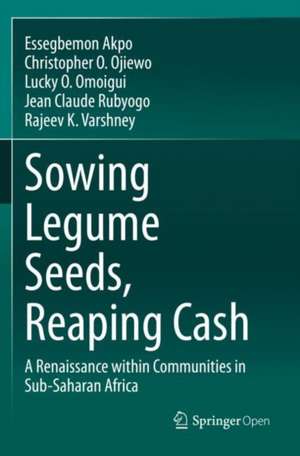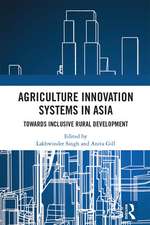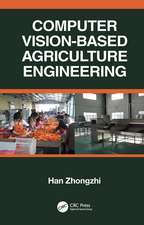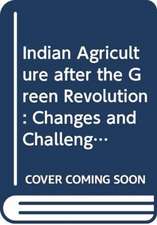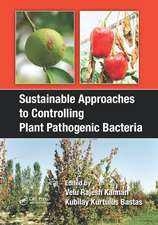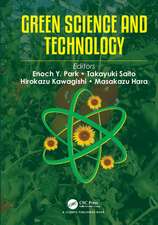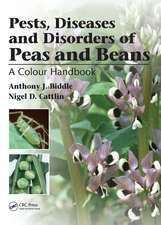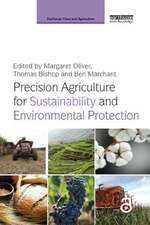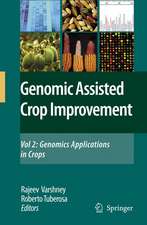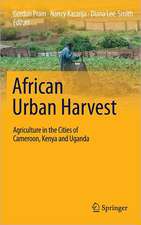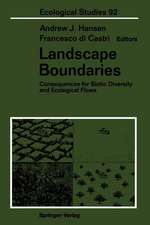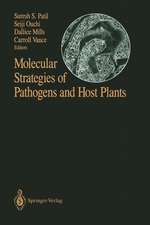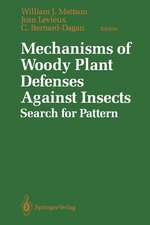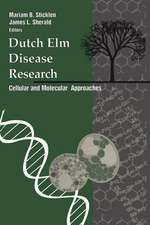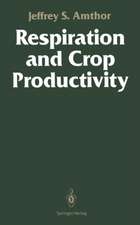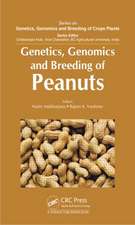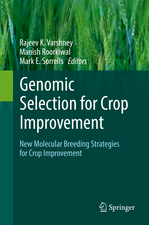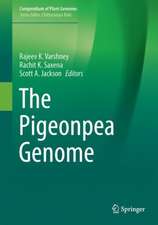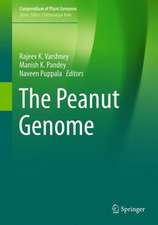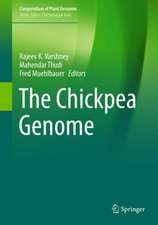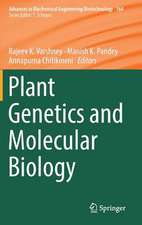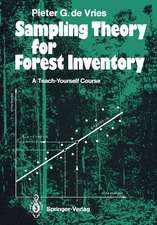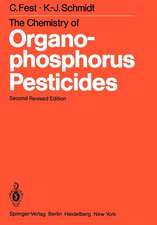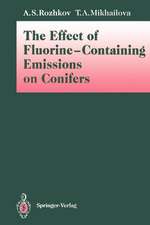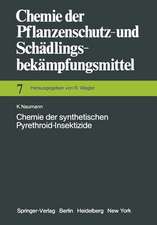Sowing Legume Seeds, Reaping Cash: A Renaissance within Communities in Sub-Saharan Africa
Autor Essegbemon Akpo, Christopher O. Ojiewo, Lucky O. Omoigui, Jean Claude Rubyogo, Rajeev K. Varshneyen Limba Engleză Paperback – 18 sep 2020
| Toate formatele și edițiile | Preț | Express |
|---|---|---|
| Paperback (1) | 349.41 lei 38-44 zile | |
| Springer Nature Singapore – 18 sep 2020 | 349.41 lei 38-44 zile | |
| Hardback (1) | 364.92 lei 38-44 zile | |
| Springer Nature Singapore – 11 mar 2020 | 364.92 lei 38-44 zile |
Preț: 349.41 lei
Nou
Puncte Express: 524
Preț estimativ în valută:
66.86€ • 69.99$ • 55.32£
66.86€ • 69.99$ • 55.32£
Carte tipărită la comandă
Livrare economică 02-08 aprilie
Preluare comenzi: 021 569.72.76
Specificații
ISBN-13: 9789811508479
ISBN-10: 981150847X
Pagini: 106
Ilustrații: XVI, 106 p. 106 illus., 78 illus. in color.
Dimensiuni: 155 x 235 mm
Ediția:1st ed. 2020
Editura: Springer Nature Singapore
Colecția Springer
Locul publicării:Singapore, Singapore
ISBN-10: 981150847X
Pagini: 106
Ilustrații: XVI, 106 p. 106 illus., 78 illus. in color.
Dimensiuni: 155 x 235 mm
Ediția:1st ed. 2020
Editura: Springer Nature Singapore
Colecția Springer
Locul publicării:Singapore, Singapore
Cuprins
Chapter 1. A Brief Overview of Smallholder Farmers' Access To Seed Of Improved Legume Varieties.- Chapter 2. Impact Stories And Testimonies From Diverse Actors In Groundnut Value Chain In Tanzania.- Chapter 3. Common Bean Value Chain Actors Share Their Feeling About TL Projects In Tanzania.- Chapter 4. Enthusiasm Of Actors Within The Groundnut Value Chain Sharing Impact Stories In Uganda.- 5. Empowered Communities Tell Their Own Stories From Common Bean Production In Uganda.- 6. Breakthroughs In Groundnut Production Communities In Nigeria.- 7. Women At The Center Of Cowpea Value Chain Development In Nigeria.- 8. Better-Off Women Boosting Groundnut Business In Ghana.- 9. Concluding Remarks: The Tropical Legumes Projects Empowered Communities In A Wide Variety Of Assets.
Notă biografică
Dr Essegbemon Akpo is Seed Systems scientist with expertise in plant production, seed systems, innovation studies, participatory action research, and multi-stakeholder processes. He graduated from Wageningen University, The Netherlands. His 15 years experiences in agricultural research for development covered improved seed access facilitation for smallholder farmers, connection between biophysical, social and institutional landscapes, participatory technology development, innovation platform support, capacity building for farmers’ organizations. He earned several academic awards that permitted him to pursue graduate studies (Research grant within the Convergence of Science Strengthening Agricultural Innovation Systems (CoS-SIS) in 2008, Research grant as part of the Convergence of Science for better Management of Crops and Soils (CoS) Project- DGIS in 2005, Research grant as part of the Cowpea Project, Bénin, NWO-FAO in 2003). Dr Akpo has authored over 15 publications including peer-review papers, books and conferences papers.
Dr. Chris Ojiewo graduated from Okayama University, Japan. He is a Senior Scientist in Legume Breeding, Global Co-coordinator of Tropical Legumes III, HOPEII and AVISA projects (funded by Bill & Melinda Gates Foundation), Cluster of Activities Leader on Science of Scaling Seed Technologies in the CGIAR Research Program (CRP) on Grain Legumes and Dryland Cereals and Theme Leader of Seed Systems in the Global Research Program on Genetic Gains, ICRISAT. He has more than 60 peer reviewed international publications and has delivered numerous oral and posters presentations in numerous international meetings. Dr Ojiewo’s research work focusses on basic, applied, and adaptive research and development activities aimed at raising farm productivity, nutrition and income security for resource-poor smallholder farm households, especially women and youth in rural and peri-urban semi-arid tropics. With expertise in plant breeding andseed systems, he has done extensive work in the development and dissemination of high-yielding and stress (biotic and abiotic) – resilient varieties of vegetables and legumes with farmer and market preferred traits together with accompanying integrated crop management practices and efficient seed and technology dissemination systems. Besides, promotion of vegetable-legume-cereal-livestock based family garden intensification systems, improving productivity and profitability for small-holder farmers, gender equity, youth empowerment, nutrition security, knowledge sharing and solving the perpetual problem of food and nutritional insecurity of the less privileged in developing countries are core to his sense of purpose.
Dr. Lucky O. Omoigui graduated from the Ahmadu Bello University, Zaria Nigeria in 2010. He is a Seed System specialist at the International Institute of Tropical Agriculture (IITA), Kano Station. He has more than 74 peer reviewed international publications andhas delivered numerous oral and poster presentations in numerous international meetings. Dr Omoigui was an Associate Professor of Plant Breeding and Genetics, University of Agriculture Makurdi from 2013-2016. He received several awards among which are: Most Outstanding Researcher in the University of Agriculture Makurdi in 2012, Excellent Research contribution to West African Cowpea Consortium in 2015, Arthur Anderson Honour list Award for Best Graduating Student in 1999.
Dr. Chris Ojiewo graduated from Okayama University, Japan. He is a Senior Scientist in Legume Breeding, Global Co-coordinator of Tropical Legumes III, HOPEII and AVISA projects (funded by Bill & Melinda Gates Foundation), Cluster of Activities Leader on Science of Scaling Seed Technologies in the CGIAR Research Program (CRP) on Grain Legumes and Dryland Cereals and Theme Leader of Seed Systems in the Global Research Program on Genetic Gains, ICRISAT. He has more than 60 peer reviewed international publications and has delivered numerous oral and posters presentations in numerous international meetings. Dr Ojiewo’s research work focusses on basic, applied, and adaptive research and development activities aimed at raising farm productivity, nutrition and income security for resource-poor smallholder farm households, especially women and youth in rural and peri-urban semi-arid tropics. With expertise in plant breeding andseed systems, he has done extensive work in the development and dissemination of high-yielding and stress (biotic and abiotic) – resilient varieties of vegetables and legumes with farmer and market preferred traits together with accompanying integrated crop management practices and efficient seed and technology dissemination systems. Besides, promotion of vegetable-legume-cereal-livestock based family garden intensification systems, improving productivity and profitability for small-holder farmers, gender equity, youth empowerment, nutrition security, knowledge sharing and solving the perpetual problem of food and nutritional insecurity of the less privileged in developing countries are core to his sense of purpose.
Dr. Lucky O. Omoigui graduated from the Ahmadu Bello University, Zaria Nigeria in 2010. He is a Seed System specialist at the International Institute of Tropical Agriculture (IITA), Kano Station. He has more than 74 peer reviewed international publications andhas delivered numerous oral and poster presentations in numerous international meetings. Dr Omoigui was an Associate Professor of Plant Breeding and Genetics, University of Agriculture Makurdi from 2013-2016. He received several awards among which are: Most Outstanding Researcher in the University of Agriculture Makurdi in 2012, Excellent Research contribution to West African Cowpea Consortium in 2015, Arthur Anderson Honour list Award for Best Graduating Student in 1999.
Dr. Jean Claude Rubyogo is a CIAT Senior Scientist based in Arusha –Tanzania. He focuses on seed systems research and development, technology transfer and research product commercialization. For more than thirty years, he has contributed/ led several research and development initiatives in various agricultural research areas including participatory crop research (both on station and on farm), testing agricultural technologies and partnership to commercialize and scale up these proven technologies. For the last fifteen years, he has been leading public private multi-sectoral and multi-disciplinary teams developing and deploying sustainable and impact oriented bean seed systems to serve more than 27 million of smallholder farmers (58% being women) across several member countries of the Pan Africa Bean Research Alliance. Jean Claude has extensively published several articles, books and book chapters on bean seed systems and technology transfer.
Dr Rajeev K Varshney, Research Program Director, Genetic Gains & Director, Center of Excellence in Genomics and Systems Biology at ICRISAT, has >15 years research experience in international agriculture. Before joining ICRISAT in 2005, he worked at IPK-Gatersleben, Germany for five years. While working at ICRISAT, in his dual appointment for six year, he also served CGIAR Generation Challenge Program as Theme Leader. Varshney is recognized as a leader in applied genomics, genomics-assisted breeding and translational genomics for agriculture. He has genome sequences of 9 crops including pigeonpea, chickpea, peanut and pearl millet and several molecular breeding products in chickpea, peanut and pigeonpea to his credit. Varshney is an elected Fellow of Leopoldina- German National Academy of Sciences, American Association of Advancement in Sciences (USA), The World Academy of Sciences, Crop Sciences Society of America, American Society of Agronomy and all 4 leading science academies of India: Indian Academy of Sciences, Indian National Science Academy, The National Academy of Sciences and National Academy of Agricultural Sciences. He provides leadership by serving as member/chair for several committees, editorial boards, funding organizations and advisory boards in international agriculture research, development and capacity building.
Dr Rajeev K Varshney, Research Program Director, Genetic Gains & Director, Center of Excellence in Genomics and Systems Biology at ICRISAT, has >15 years research experience in international agriculture. Before joining ICRISAT in 2005, he worked at IPK-Gatersleben, Germany for five years. While working at ICRISAT, in his dual appointment for six year, he also served CGIAR Generation Challenge Program as Theme Leader. Varshney is recognized as a leader in applied genomics, genomics-assisted breeding and translational genomics for agriculture. He has genome sequences of 9 crops including pigeonpea, chickpea, peanut and pearl millet and several molecular breeding products in chickpea, peanut and pigeonpea to his credit. Varshney is an elected Fellow of Leopoldina- German National Academy of Sciences, American Association of Advancement in Sciences (USA), The World Academy of Sciences, Crop Sciences Society of America, American Society of Agronomy and all 4 leading science academies of India: Indian Academy of Sciences, Indian National Science Academy, The National Academy of Sciences and National Academy of Agricultural Sciences. He provides leadership by serving as member/chair for several committees, editorial boards, funding organizations and advisory boards in international agriculture research, development and capacity building.
Textul de pe ultima copertă
This open access book shares impact stories – testimonies from various value chain actors who have been part of the Tropical Legumes (TL) projects, over the past twelve years. The Tropical Legumes projects led by ICRISAT in three parts (TLI, TLII and TLIII), constitute a major international initiative supported by the Bill & Melinda Gates Foundation (BMGF) and jointly implemented by the International Center for Tropical Agriculture (CIAT), International Institute of Tropical Agriculture (IITA) and National Agricultural Research Systems (NARS) partners from Sub-Saharan Africa and India. The project developed improved cultivars of common bean, cowpea, chickpea and groundnut (but also soya bean and pigeon pea cultivars in its initial phases) and delivers their seed to smallholders in BMGF-focus areas. It also strengthens the NARS and CGIAR's breeding programs and seed platforms to enhance their ability to deliver high and sustained outputs to smallholder farmers.
The book compiles the experiences of a diversity of actors within the grain legume value chains, with a focus on groundnut and common beans in Tanzania and Uganda, groundnut and cowpea in Nigeria, and groundnut in Ghana. All stakeholders involved share their thoughts on being part of a decade-long development project family. National agricultural research institutes, knowledge brokering organizations, NGOs, public and private seed companies, agro-dealers, individual seed entrepreneurs, farm-implement makers, farmer cooperatives, farmer groups, individual men and women farmers, middlemen, processors, traders and consumers were all involved in this project, and as such this book provides valuable insights for development workers, technical staff, and project managers.
The book compiles the experiences of a diversity of actors within the grain legume value chains, with a focus on groundnut and common beans in Tanzania and Uganda, groundnut and cowpea in Nigeria, and groundnut in Ghana. All stakeholders involved share their thoughts on being part of a decade-long development project family. National agricultural research institutes, knowledge brokering organizations, NGOs, public and private seed companies, agro-dealers, individual seed entrepreneurs, farm-implement makers, farmer cooperatives, farmer groups, individual men and women farmers, middlemen, processors, traders and consumers were all involved in this project, and as such this book provides valuable insights for development workers, technical staff, and project managers.
Caracteristici
Open Access narrative of Tropical Legumes (TL) projects led by ICRISAT An inclusive coverage of impact stories, testimonies and capacity development for all stakeholders involved Highlights the positive impacts of Tropical Legumes (TL) projects for under-served and poor communities in developing world Shares illustrative field pictures of impact created per crop and in each country
